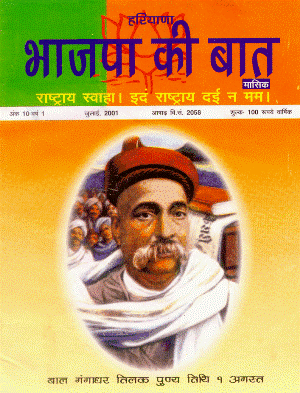Co-ops get their moment in the sun » Bhajpa Ki Baat
Share

The budget, the PM Shri Narendra Modi described as “historic” focuses on small and medium artisans, women, agriculture and green technology, among other things. For the first time the country has come up with many schemes as a tribute to the hard work of carpenters, goldsmiths, potters and other artisans, who are the nation’s creators
AMIT SHAH
The first budget of Amrit Kaal has laid a strong foundation to fulfil the aspiration of a developed India by shoring up capital expenditure in infrastructure, slashing taxes and maintaining macroeconomic stability through fiscal prudence. Formulated under the able and dynamic leadership of PM Modi, the budget will not only help India retain its place among the fastest-growing economies of the world but will also lift global mood.
The budget, the PM Shri Narendra Modi described as “historic” focuses on small and medium artisans, women, agriculture and green technology, among other things. For the first time the country has come up with many schemes as a tribute to the hard work of carpenters, goldsmiths, potters and other artisans, who are the nation’s creators and carriers of our cultural heritage. The Pradhan Mantri Vishwakarma Kaushal Samman yojana is a long-deserved recognition of their contribution to the nation.
In a revolutionary move powering the cooperative sector, the backbone of India’s rural economy, PM Narendra Modi in 2021 established a ministry for cooperatives. I am fortunate to have been given its charge. The budget has provided a much-needed booster dose to the sector by announcing several favourable measures –such as the
To initiate corrective measures, the government is establishing a national database of cooperatives, and the work related to this is almost complete.
setting up of massive, decentralised storage capacity so that farmers can store their produce and realise remunerative prices by selling at an appropriate time. This will be the world’s largest grain storage facility.
Plus, to promote the growth of new cooperative manufacturing societies, the budget has announced a concessional income tax rate of 15% for cooperatives that begin manufacturing before March 31, 2024, as is the case with new manufacturing companies in the country.
The budget has also increased to Rs 2 lakh per member, the limit of cash deposits to and loans in cash by primary agricultural cooperative societies (PACs) and primary cooperative agricultural and rural development banks. Cooperative societies have been given a higher limit of Rs 3 crore for tax deducted at source on cash withdrawals. For sugar cooperative mills, the claims for payment made to sugar farmers before the assessment year 2016-17 will now be considered an ‘expenditure’. This is expected to provide approximately Rs 10,000 crore in relief to the sugar cooperatives.
Though cooperatives have been playing a critical role in our economy for a long time, there are significant sectoral and geographical variations in their presence. To initiate corrective measures, the government is establishing a national database of cooperatives, and the work related to this is almost complete.
Further, under the PM’s leadership a committee has been constituted by the cooperation ministry to formulate a National Cooperative Policy, which will include stakeholders’ recommendations and become a vital link to connect the masses with the country’s financial system. The Modi government is working towards establishing a National Cooperative University to provide trained manpower to this sector.
The budget also announced that model bye-laws for PACS are being formulated, to enable them to become multipurpose cooperatives to meet the country’s diverse needs and remain financially profitable. Recently an MoU has been signed among the cooperation ministry, the IT ministry, NABARD, and CSC e-Governance Services India Limited. This MoU will enable PACS to provide the services offered by the Common Service Centre. Computerisation of 63,000 agricultural cooperatives has already been started, at a cost of Rs 2,516 crore.
After many decades, the significant contributions of cooperative societies to national development are being acknowledged and respected. After all, these players continue to play a critical role in sustaining the viability of agrarian and non-agrarian occupations in a rural economy by disbursing loans at low-interest rates with flexible repayment terms.
Cooperative societies help small-scale entrepreneurs procure raw materials at discounted rates and reduce production costs. They provide producers with a platform to sell their products directly to consumers by removing intermediaries, which helps cut the selling price and ensure higher sales and profits for producers. Their significant role in bridging the urban-rural divide and creating opportunities for income generation can hardly be discounted. They also act as drivers of the national economy by providing critical raw materials and intermediate goods to large industries, which is a significant contribution to India’s growing export markets.
Cooperative societies also have many success stories to narrate. Dairy cooperatives have ushered in the milk revolution in the country, with Amul becoming a household name. Alongside Lijjat Papad. Similarly, institutions like IFFCO and KRIBHCO have been drivers of farm sector growth in the country. Besides, many cooperatives at the
Currently, more than half of India’s population is linked to a cooperative in some way, with cooperatives covering 70% of the country’s farmers through PACS. There are 33 state-level cooperative banks, 363 district-level cooperative banks and 63,000 PACS in the country
state level – including urban cooperative banks, PACS, housing cooperatives and fisheries cooperatives – are making untiring efforts to improve the socio-economic condition of the people in rural areas.
Currently, more than half of India’s population is linked to a cooperative in some way, with cooperatives covering 70% of the country’s farmers through PACS. There are 33 state-level cooperative banks, 363 district-level cooperative banks and 63,000 PACS in the country. Moreover, today cooperatives carry out 19% of the country’s agriculture finance, 35% fertiliser distribution, 30% fertiliser production, 40% sugar production, 13% wheat procurement and20% paddy procurement. In addition, nearly 500 cooperatives have been registered in the GeM portal, enabling them to make purchases from more than 40 lakh sellers.
I thank PM Modi and FM Sitharaman for giving much-needed boost to the cooperative sector in this budget. Given the way PM Modi, with the resolve of ‘Sahakar Se Sammriddhi’, has brought cooperatives to the forefront of the nation’s economic discourse, I am confident that they will soon be one of the main drivers of India’s growth engine.
(The writer is the Union Home and Cooperation Minister, Government of India)
Related
(News Source -Except for the headline, this story has not been edited by Bhajpa Ki Baat staff and is published from a BJP KS feed.)
















